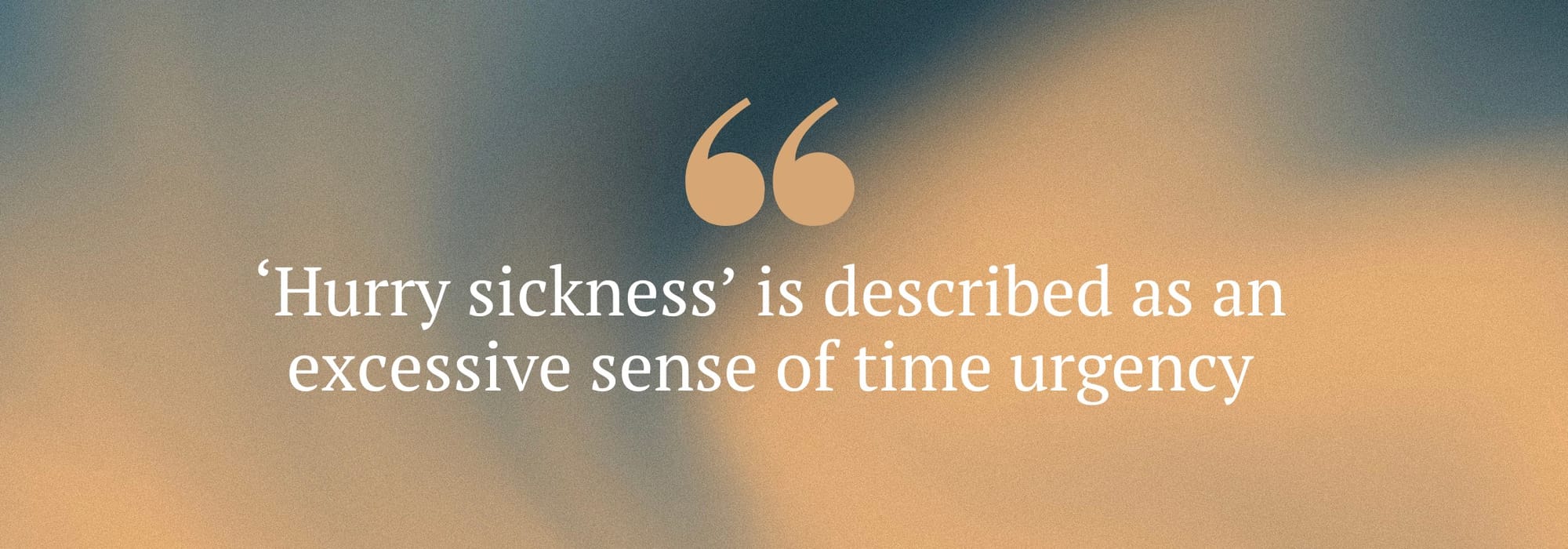Are you always rushing from one thing to the next? You could be experiencing hurry sickness, and it may be doing more damage than you think
I’ve spent most of my life rushing, never quite sure of what I was rushing for. That inexplicable sense of urgency would drive me in the mornings to get my children dressed, pack their lunches, and make myself presentable, all without much of an exhale. I’d carry it with me to work, attempting to multitask where possible, despite no one putting any pressure on me except for myself. I’d then dart out at 5pm, speed to the local supermarket to grab whatever item I forgot during the big shop, before hurrying home to get back into mum-mode. I was exhausted.
So, I Googled it. Initially, I thought, ‘rushing syndrome’ or ‘to-doitis’ must be a thing. And, as it turns out, it was. They just opted for a less catchy name: ‘hurry sickness’.
What is hurry sickness?
Coined by cardiologists Meyer Friedman and RH Rosenman in their 1985 book Type A Behavior and Your Heart, ‘hurry sickness’ is described as an excessive sense of time urgency. Despite its name, hurry sickness isn’t an actual medical or mental health condition, but is widely regarded as a legitimate wellbeing concern.
Counsellor Georgina Sturmer encourages us to consider the drivers behind our hurrying behaviours – that is, the internal messages that play out in our everyday lives as a way of motivating us to be productive. She recognises that while these drivers can be helpful, in that they spur us on to get things done, they can also lead to unhelpful behaviours, such as a constant state of rush.
She implores us to listen to the dialogue that runs in our minds as we begin to slow down. Does it celebrate the idea that you’re giving yourself some rest, or does it chastise you for wasting time? Georgina acknowledges that a big part of our self-esteem is wrapped up in being busy and, therefore, when we stop, we’re left with a sense of guilt or unease. This might be about the fear of what will happen if we stop but, as I’d realise in my own life, nothing would happen other than the stress I’d inflict upon myself.
There are, of course, certain traits Georgina points to that lend themselves to hurry sickness. “It is often linked to a sense of perfectionism and control,” she says. “If we are always trying to control everything, or create perfection, then it’s likely that we are always going to feel as if we should be in a hurry.”

A cultural phenomenon
Even if we don’t consider ourselves perfectionists, we are part of a digital world that, as Georgina references, prizes productivity. Everything around our society is geared towards optimal productivity – sending a clear message that ‘doing’ is the sign of a healthy and happy person.
This narrative may feel particularly relevant to the modern woman, who tells herself she ought to multitask simply because she can. I feel this to my core as a mother, and carrying the “mental load of my family”, as Georgina describes it, and the added pressure of feeling as though I’d be letting others down if I stopped.
This would drive so much of my own rushing – to get back to my children, to cater to their every whim, to always be there. My identity felt inherently tied up in their needs, as opposed to my own. Guilt was driving my doing, but at what cost?
The impact of hurry sickness on our health
I’d hear my internal voice listing to-dos, as my kids and my husband relayed their day to me. As Georgina explains, “Sometimes we get stuck in a trap of thinking that everyone wants us to be endlessly helpful, but actually the opposite might be true.” Surely this inability to remain present and engaged would have a far greater impact on them, than if I didn’t immediately tidy up after them?
Other than the potential impact on our relationships, hurry sickness can have physical ramifications, too. “If we are constantly feeling stressed or guilty about what we have or haven’t done, this can manifest in the physical sensations of stress or anxiety, which can lead to headaches, shallow breathing, stomach pain, and difficulty sleeping,” Georgina explains.
In fact, a study, published in the journal JAMA, found evidence to suggest that certain traits, including time urgency and impatience, led to an increased risk for high blood pressure – a stark indication that hurrying can have very real consequences for our bodies.
Learning how to slow down and halt the hurry
“It’s important to really think about the root cause first,” advises Georgina. “If we can understand our internal messages about our constant hurrying, this can help us to come up with a plan.”
It’s about making a conscious effort not just to manage your life, but to live it. Georgina recommends making free time to link in with a sensory experience – enjoying a walk while listening to the birds, or eating a meal mindfully, for example. By engaging with our senses, we’re reminding ourselves of our human qualities, as opposed to our obsession with productivity.

We can also take practical steps which will appeal to our productive selves, such as bunching similar tasks together, and making a non-negotiable schedule for free time. Georgina believes it might also be helpful to step away from our devices. “The constant notifications of our screens can really add to the pressure if we’re already struggling with hurry sickness,” she says.
It can be difficult to challenge hurry sickness, especially when it is connected to some of our core beliefs, be this around our self-esteem or sense of responsibility towards others. But, by making the realisation that maybe you’re a serial rusher, you can take that all-important step towards slowing down. In the long run, the benefits will far outweigh a page full of ticked-off to-dos.


Comments